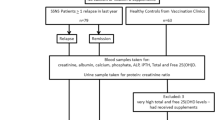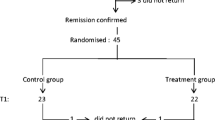Abstract
Serum 25-hydroxyvitamin D [25(OH)D] concentrations are the best indicator of vitamin D nutritional status. We measured serum 25(OH)D concentrations in 94 healthy controls and in 41 subjects (aged 4–22 years) with steroid-sensitive nephrotic syndrome (SSNS) in remission. Children with remitted SSNS had significantly lower 25(OH)D concentrations than healthy controls (median 16.4 ng/ml versus 23.9 ng/ml, P <0.001). In a multivariable logistic regression model, the odds ratios (OR) of vitamin D insufficiency [25(OH)D <20 ng/ml] were independently increased in SSNS subjects [OR 11.2 (95% confidence interval 3.5–36.2)], non-whites [OR 12.9 (4.6–36.2)], older children [OR 1.20 per year (1.06–1.36)], and winter months [OR 6.7 (2.5–18.4)]. Within the SSNS subjects, multiple linear regression determined that serum 25(OH)D concentrations were not associated with SSNS disease characteristics measured in this study, such as duration of disease, number of relapses, cumulative glucocorticoids, and interval since last relapse. In conclusion, children with remitted SSNS have lower serum 25(OH)D concentrations than healthy controls. This difference persisted after adjusting for the potential confounding effects of age, race, season, and milk intake. Children with remitted SSNS may benefit from routine measurement of 25(OH)D, but the clinical significance of low 25(OH)D in this population remains unclear.



Similar content being viewed by others
References
Alon U, Chan JC (1984) Calcium and vitamin D homeostasis in the nephrotic syndrome: current status. Nephron 36:1–4
Auwerx J, De Keyser L, Bouillon R, De Moor P (1986) Decreased free 1,25-dihydroxycholecalciferol index in patients with the nephrotic syndrome. Nephron 42:231–235
Grymonprez A, Proesmans W, Van Dyck M, Jans I, Goos G, Bouillon R (1995) Vitamin D metabolites in childhood nephrotic syndrome. Pediatr Nephrol 9:278–281
Freundlich M, Bourgoignie JJ, Zilleruelo G, Jacob AI, Canterbury JM, Strauss J (1985) Bone modulating factors in nephrotic children with normal glomerular filtration rate. Pediatrics 76:280–285
Freundlich M, Bourgoignie JJ, Zilleruelo G, Abitbol C, Canterbury JM, Strauss J (1986) Calcium and vitamin D metabolism in children with nephrotic syndrome. J Pediatr 108:383–387
Huang JP, Bai KM, Wang BL (1992) Vitamin D and calcium metabolism in children with nephrotic syndrome of normal renal function. Chin Med J (Engl) 105:828–832
Hollis BW (1996) Assessment of vitamin D nutritional and hormonal status: what to measure and how to do it. Calcif Tissue Int 58:4–5
Barragry JM, France MW, Carter ND, Auton JA, Beer M, Boucher BJ, Cohen RD (1977) Vitamin-D metabolism in nephrotic syndrome. Lancet II:629–632
Goldstein DA, Haldimann B, Sherman D, Norman AW, Massry SG (1981) Vitamin D metabolites and calcium metabolism in patients with nephrotic syndrome and normal renal function. J Clin Endocrinol Metab 52:116–121
Malluche HH, Goldstein DA, Massry SG (1979) Osteomalacia and hyperparathyroid bone disease in patients with nephrotic syndrome. J Clin Invest 63:494–500
Mittal SK, Dash SC, Tiwari SC, Agarwal SK, Saxena S, Fishbane S (1999) Bone histology in patients with nephrotic syndrome and normal renal function. Kidney Int 55:1912–1919
Tessitore N, Bonucci E, D’Angelo A, Lund B, Corgnati A, Valvo E, Lupo A, Loschiavo C, Fabris A, et al. (1984) Bone histology and calcium metabolism in patients with nephrotic syndrome and normal or reduced renal function. Nephron 37:153–159
Freundlich M, Jofe M, Goodman WG, Salusky IB (2004) Bone histology in steroid-treated children with non-azotemic nephrotic syndrome. Pediatr Nephrol 19:400–407
Eddy AA, Symons JM (2003) Nephrotic syndrome in childhood. Lancet 362:629–639
Alon US (1995) Vitamin D metabolites in childhood nephrotic syndrome. Pediatr Nephrol 9:791–792
National Kidney Foundation (2003) K/DOQI clinical practice guidelines for bone metabolism and disease in chronic kidney disease. Am J Kidney Dis 42:S1–S202
International Study of Kidney Disease in Children (1981) The primary nephrotic syndrome in children. Identification of patients with minimal change nephrotic syndrome from initial response to prednisone. J Pediatr 98:561–564
Schwartz GJ, Haycock GB, Edelmann CM Jr, Spitzer A (1976) A simple estimate of glomerular filtration rate in children derived from body length and plasma creatinine. Pediatrics 58:259–263
Ogden CL, Kuczmarski RJ, Flegal KM, Mei Z, Guo S, Wei R, Grummer-Strawn LM, Curtin LR, Roche AF, Johnson CL (2002) Centers for Disease Control and Prevention 2000 growth charts for the United States: improvements to the 1977 National Center for Health Statistics version. Pediatrics 109:45–60
Hollis BW, Kamerud JQ, Selvaag SR, Lorenz JD, Napoli JL (1993) Determination of vitamin D status by radioimmunoassay with an125I-labeled tracer. Clin Chem 39:529–533
Hollis BW, Kamerud JQ, Kurkowski A, Beaulieu J, Napoli JL (1996) Quantification of circulating 1,25-dihydroxyvitamin D by radioimmunoassay with125I-labeled tracer. Clin Chem 42:586–592
Bouillon R, Coopmans W, Degroote DE, Radoux D, Eliard PH (1990) Immunoradiometric assay of parathyrin with polyclonal and monoclonal region-specific antibodies. Clin Chem 36:271–276
Guillemant J, Cabrol S, Allemandou A, Peres G, Guillemant S (1995) Vitamin D-dependent seasonal variation of PTH in growing male adolescents. Bone 17:513–516
Webb AR, Kline L, Holick MF (1988) Influence of season and latitude on the cutaneous synthesis of vitamin D3: exposure to winter sunlight in Boston and Edmonton will not promote vitamin D3 synthesis in human skin. J Clin Endocrinol Metab 67:373–378
Cannata-Andia JB, Gomez Alonso C (2002) Vitamin D deficiency: a neglected aspect of disturbed calcium metabolism in renal failure. Nephrol Dial Transplant 17:1875–1878
McKenna MJ, Freaney R (1998) Secondary hyperparathyroidism in the elderly: means to defining hypovitaminosis D. Osteoporos Int 8 [Suppl 2]:S3–S6
Hosmer DW, Lemeshow S (2000) Applied logistic regression, 2nd ed. Wiley, New York, pp 91–202
Sun GW, Shook TL, Kay GL (1996) Inappropriate use of bivariable analysis to screen risk factors for use in multivariable analysis. J Clin Epidemiol 49:907–916
Sherbotle JR, Hoyer JR (1991) Idiopathic nephrotic syndrome: minimal-change disease and focal segmental glomerulosclerosis. In: Jacobson HB, Striker GE, Klahr S (eds) The principles and practice of nephrology. Decker, Philadelphia, pp 288–292
Arbeitsgemeinschaft fur Padiatrische Nephrologie (1988) Short versus standard prednisone therapy for initial treatment of idiopathic nephrotic syndrome in children. Lancet I:380–383
Matsuoka LY, Ide L, Wortsman J, MacLaughlin JA, Holick MF (1987) Sunscreens suppress cutaneous vitamin D3 synthesis. J Clin Endocrinol Metab 64:1165–1168
Matsuoka LY, Wortsman J, Dannenberg MJ, Hollis BW, Lu Z, Holick MF (1992) Clothing prevents ultraviolet-B radiation-dependent photosynthesis of vitamin D3. J Clin Endocrinol Metab 75:1099–1103
Nesby-O’Dell S, Scanlon KS, Cogswell ME, Gillespie C, Hollis BW, Looker AC, Allen C, Doughertly C, Gunter EW, Bowman BA (2002) Hypovitaminosis D prevalence and determinants among African American and white women of reproductive age: third National Health and Nutrition Examination Survey, 1988–1994. Am J Clin Nutr 76:187–192
Gessner BD, Plotnik J, Muth PT (2003) 25-Hydroxyvitamin D levels among healthy children in Alaska. J Pediatr 143:434–437
Shaw NJ, Pal BR (2002) Vitamin D deficiency in UK Asian families: activating a new concern. Arch Dis Child 86:147–149
Looker AC, Dawson-Hughes B, Calvo MS, Gunter EW, Sahyoun NR (2002) Serum 25-hydroxyvitamin D status of adolescents and adults in two seasonal subpopulations from NHANES III. Bone 30:771–777
Holick MF, Matsuoka LY, Wortsman J (1989) Age, vitamin D, and solar ultraviolet. Lancet II:1104–1105
Cheng S, Tylavsky F, Kroger H, Karkkainen M, Lyytikainen A, Koistinen A, Mahonen A, Alen M, Halleen J, Vaananen K, Lamberg-Allardt C (2003) Association of low 25-hydroxyvitamin D concentrations with elevated parathyroid hormone concentrations and low cortical bone density in early pubertal and prepubertal Finnish girls. Am J Clin Nutr 78:485–492
Gordon CM, DePeter KC, Feldman HA, Grace E, Emans SJ (2004) Prevalence of vitamin D deficiency among healthy adolescents. Arch Pediatr Adolesc Med 158:531–537
Greer FR (2003) Vitamin D deficiency—it’s more than rickets. J Pediatr 143:422–423
Parfitt AM, Gallagher JC, Heaney RP, Johnston CC, Neer R, Whedon GD (1982) Vitamin D and bone health in the elderly. Am J Clin Nutr 36:1014–1031
Leonard MB, Feldman HI, Shults J, Zemel BS, Foster BJ, Stallings VA (2004) Long-term, high-dose glucocorticoids and bone mineral content in childhood glucocorticoid-sensitive nephrotic syndrome. N Engl J Med 351:868–875
Holick MF (2004) Vitamin D: importance in the prevention of cancers, type 1 diabetes, heart disease, and osteoporosis. Am J Clin Nutr 79:362–371
Acknowledgments
We greatly appreciate the dedication and enthusiasm of the children and their families who participated in this study. This study was supported in part by grants F32-DK062580 (F.L.W.), K08-DK002523 (M.B.L.), and M01-RR000240–390465 (The Children’s Hospital of Philadelphia General Clinical Research Center) from the National Institutes of Health.
Author information
Authors and Affiliations
Corresponding author
Rights and permissions
About this article
Cite this article
Weng, F.L., Shults, J., Herskovitz, R.M. et al. Vitamin D insufficiency in steroid-sensitive nephrotic syndrome in remission. Pediatr Nephrol 20, 56–63 (2005). https://doi.org/10.1007/s00467-004-1694-7
Received:
Revised:
Accepted:
Published:
Issue Date:
DOI: https://doi.org/10.1007/s00467-004-1694-7




